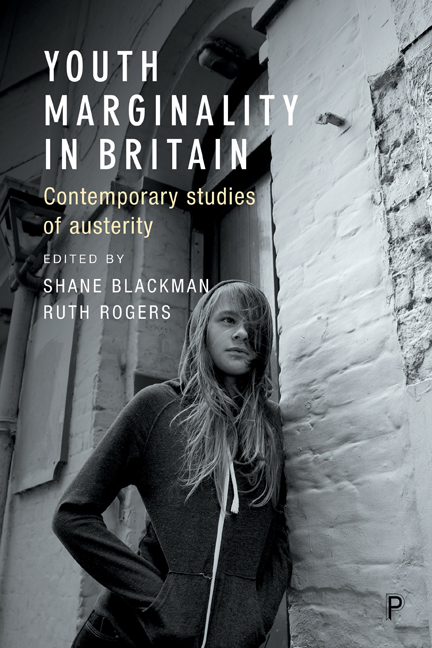five - Normalisation of youth austerity through entertainment: critically addressing media representations of youth marginality in Britain
Published online by Cambridge University Press: 05 April 2022
Summary
Introduction
This chapter focuses on how newspaper headlines and reality TV programmes exploit forms of popular culture such as successful television series to convey a political and moral message that reinforces the marginality of young adults in society. Critically, we call upon the ‘returned gaze’ of youth positioned in austerity, to show how young people are pushed to the edges of society by populist representations of social crisis but remain the mechanism used by both government and media to exert control. The second part of the chapter addresses two zones of media representations: where young adults are projected as scroungers and marginalised through mockery, defining them as a burden rather than an asset for society
‘Sacrificial lambs’ and a ‘smart tongue’: young adult austerity through the lens of entertainment
Initially we will examine whether young adults in popular factual TV entertainment can be described as ‘sacrificial lambs’. We identify a convergence between newspaper representations of what Loic Wacquant (2008) has called ‘advanced marginality’ with the growth of reality television programmes such as Benefits Street (screened on 6 January 2014, Channel Four). In contrast, to previous depictions of youth poverty, such as the drama documentary Cathy Come Home by Ken Loach in 1966 where the portrayal evokes empathy, much of the new image of youth poverty is delivered with little sympathy (Paterson et al, 2015). The critical attention created by Benefits Street has overshadowed previous programmes that combined both documentary and TV reality styles of production. Mail Online (21 January 2014) reported: ‘Benefits Street's parade of scroungers and drug addicts give Channel 4 its highest ratings since 2012’.
The rise of popular factual entertainment according to Corner (2000) is related to the commercial opportunities created through a deregulated television broadcasting environment, seeking to capture new audiences. For Beattie (2004, pp198-99) it is not merely that TV reality programmes are cheap in terms of production costs; he notes that popular light entertainment is increasingly replacing critical inquiry with personal confession, where the emphasis is on ‘emotion and the display of subjective feelings’.
In the UK, before Benefits Street, on 29 November 2006, the BBC produced Brian Wood's Evicted, a documentary in six parts following the personal stories of Charlotte, 13, Chloe, 7, and Sarah, 15.
- Type
- Chapter
- Information
- Youth Marginality in BritainContemporary Studies of Austerity, pp. 81 - 102Publisher: Bristol University PressPrint publication year: 2017

